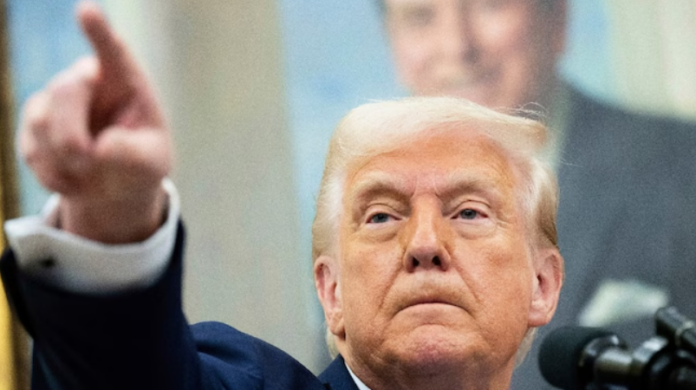Trump’s Tariff Strategy Sparks Economic Chaos, Confusion, and Political Questions
In the aftermath of President Donald Trump’s recent tariff announcement, financial markets have been in turmoil, with stock markets suffering significant losses. The president’s decision to engage in a trade war by imposing tariffs on foreign goods has sent shockwaves through the global economy, raising concerns among both financial experts and political commentators.
On Thursday, following his “Liberation Day” tariff declaration, Trump was optimistic about the outcome, telling reporters that the move would ultimately benefit the economy. “I think it’s going very well,” he said, adding that the tariffs were like a major surgery to fix a patient. “The markets are going to boom. The stock is going to boom. The country is going to boom,” Trump confidently predicted.
However, the optimism was not shared by many Americans, particularly seniors relying on stock market-linked retirement savings. Wall Street experienced its worst day in five years, with $2.5 trillion wiped off the S&P 500 index, causing panic among investors. Adding to the uncertainty, China retaliated by imposing a 34% tariff on U.S. imports, exacerbating concerns about the global trade relationship and the financial impact on American manufacturers.
Despite these developments, Trump dismissed the consequences, posting on social media, “CHINA PLAYED IT WRONG, THEY PANICKED – THE ONE THING THEY CANNOT AFFORD TO DO!” He insisted that China’s response was a mistake, suggesting that the tariffs would ultimately benefit the U.S. economy.
Conflicting Messages and Confusion
The mixed messaging from Trump’s administration has only fueled the confusion surrounding the tariffs. On one hand, Trump suggested that the tariffs were part of a negotiation strategy, offering the U.S. leverage in trade talks. On the other, top aides, including Commerce Secretary Howard Lutnick and trade adviser Peter Navarro, stated that the tariffs were not a negotiation tactic but a firm stand to protect American manufacturing.
This lack of consistency has raised questions about the White House’s strategy and its ability to handle the economic fallout from the tariff measures. Critics argue that the administration’s response has lacked clarity, with confusing calculations leading to tariffs that do not appear to be reciprocal or logically structured.
Veteran Wall Street trader Peter Tuchman voiced frustration over the administration’s approach, saying, “The formula they used… it’s like apples, oranges, a couple of cashews divided by 10 times four.” He added, “None of it makes any sense, and billions and trillions of dollars are being wiped out of the market on a day-to-day basis.”
Immediate Economic Impact
The immediate effects of the tariff announcement were felt quickly, particularly in the manufacturing sector. Stellantis, a major auto manufacturer, was forced to pause production at plants in Mexico and Canada, temporarily laying off 900 U.S.-based workers. Industry experts have warned that this is just the beginning and that the broader economy could suffer if the trade war escalates.
Financial analysts predict that the tariff measures could lead to price hikes on consumer goods, triggering a resurgence in inflation. This comes just five months after Trump’s re-election campaign, where he promised to reduce living costs for everyday Americans. The tariffs, however, seem to contradict these promises, potentially hurting the very people Trump pledged to help.
Political and Economic Consequences
While Trump and his team argue that the tariffs are necessary to rebuild American manufacturing and protect workers, critics are concerned about the long-term effects on the U.S. economy. Some political analysts suggest that the tariffs could lead to higher costs for consumers, placing a financial burden on ordinary Americans. As the stock market continues to reel from the president’s decisions, questions about the administration’s competence and approach are mounting.
Former Treasury Secretary Lawrence Summers criticized Trump’s handling of the crisis, stating, “Usually, when you have a terrible stock market experience, it’s because a bank fails or there’s a pandemic or some other country does something… but not because of policies that the president of the United States is proud of. That is something that is entirely without precedent and it is extremely dangerous.”
Trump’s handling of national security has also raised concerns. Reports of internal chaos within the White House, including the firing of several officials and conflicts with allies over foreign policy, have damaged his credibility. Critics argue that his actions, both on the economic and security fronts, are fueling instability and undermining the U.S.’s standing on the world stage.
Trump’s Support Base and Long-Term Outlook
Despite the growing economic and political challenges, Trump remains popular among his base. His supporters, many of whom are from former industrial heartlands, continue to back him despite the economic fallout. They view the tariffs as part of his broader effort to challenge global trade practices that have hurt American workers.
However, if the tariffs lead to a recession or prolonged economic hardship, Trump’s support could be tested. Political analysts suggest that while his base is loyal, more moderate voters who supported him for his economic promises may begin to reconsider their support if the pain from the trade war becomes too severe.
As the 2026 midterm elections approach, the political consequences of Trump’s tariff strategy will become clearer. Republican strategists warn that the economic disruption could be a tough sell to voters, especially if short-term pain leads to long-term costs. “The challenge these tariffs are going to present is that they are almost certainly going to raise the cost of living for Americans at least in the short-term,” said Republican pollster Kristen Soltis Anderson. “Saying that this is going to be very good for you way down the road is a tough sell for a lot of voters.”
Conclusion
Trump’s tariff strategy has created a complex web of economic uncertainty, political questions, and international tension. While the administration insists that the long-term benefits will outweigh the short-term disruptions, critics argue that the consequences of this trade war may be more damaging than anticipated. With the stock market in turmoil and the global economy on edge, the coming weeks will be crucial in determining whether Trump’s gamble will pay off or backfire.





